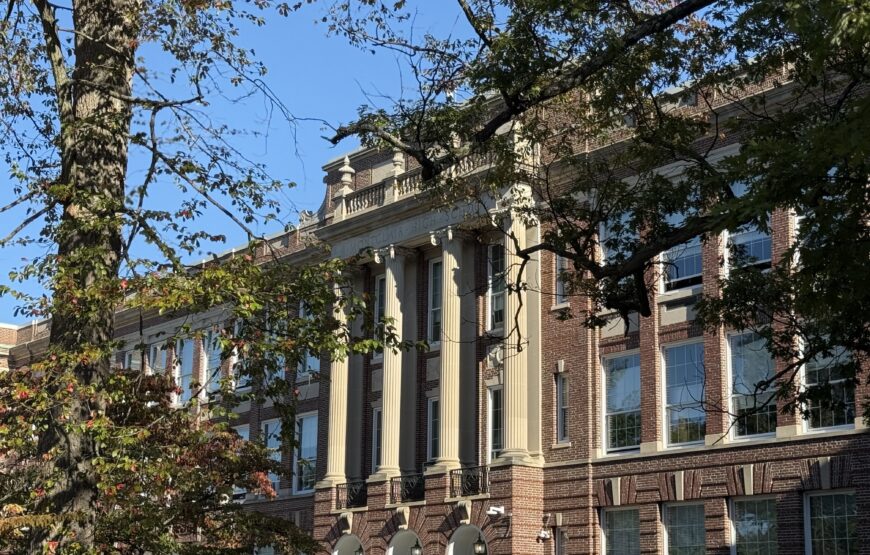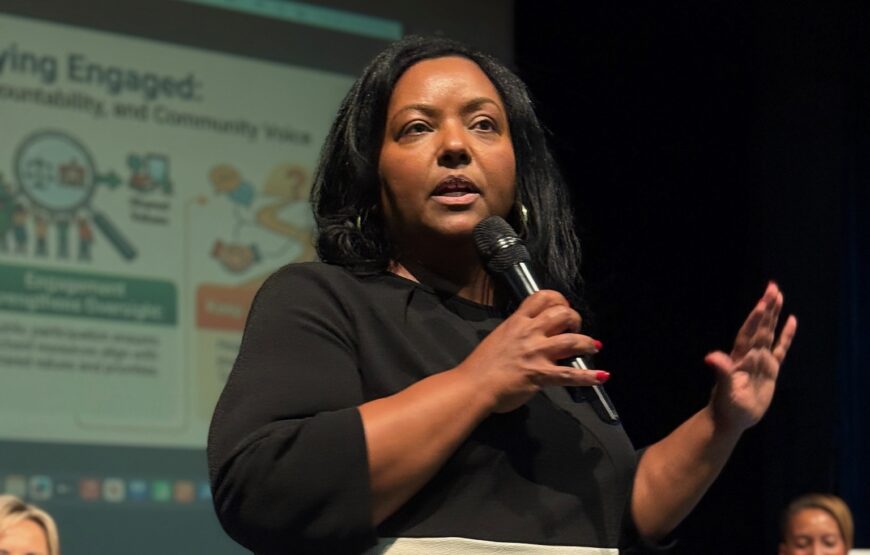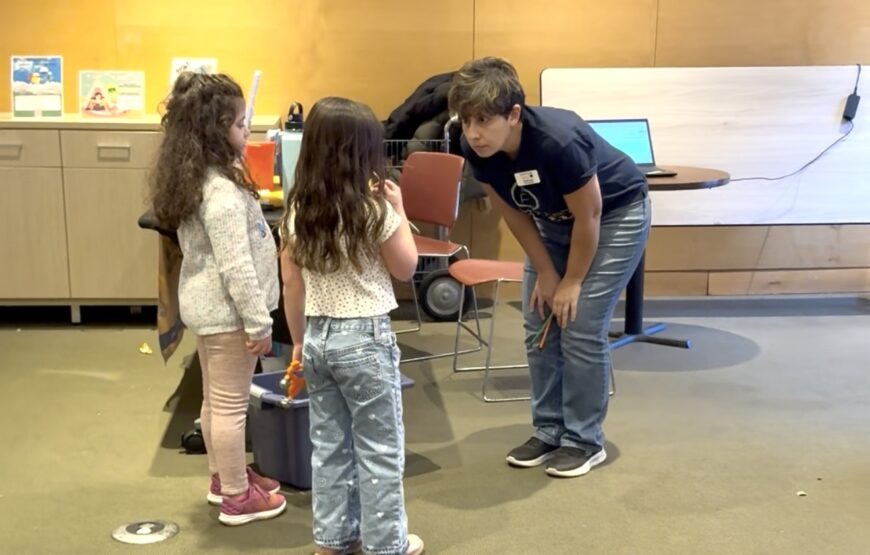Editor’s Note (Updated After Dec. 18 BOE Meeting)
At the December 18 Board of Education meeting, Superintendent Ruth B. Turner announced that if voters reject the tax increases in Question 1 or Question 2, the state will step in with “stopgap cash” — an advance on next year’s state aid — to prevent the district from collapsing financially.
This advance is not free money. Turner said it would mean about $2 million less in state aid every year until repaid, and would trigger the arrival of a state fiscal monitor with veto power over district spending, contracts, and hiring.
Turner also clarified that a “no” vote will no longer result in the drastic staffing cuts previously projected. She has asked the Board to bring back the district’s nursing staff, though not every position is expected to return. The district still faces a deep structural deficit, regardless of how voters decide.
Quick Breakdown
- If Question 1 fails: State-aid advance → years of reduced aid → state fiscal monitor
- If Question 2 fails: Same outcome
- If both pass: No state oversight, no future aid reductions — but taxes increase
Click for Our Quick Hits Summary: What We Learned from Superintendent Ruth B. Turner
- Balanced budgets going forward: Turner says past budgets “weren’t really balanced,” and committing to truly balanced budgets every year, with no mid-year surprises, is central to her plan.
- What Questions 1 & 2 actually do:
- Q1 “Yes” = covers the past $12.6M deficit without a 10-year state aid advance.
- Q2 “Yes” = addresses the current $7M shortfall, restores some essential programs, and helps cover rising costs (salaries, healthcare) via a permanent tax increase.
- If Question 1 fails: The district would likely take a 10-year advance on state aid, losing about $1–1.1M per year off the top of its state funding, which Turner says is a bigger concern for her than the monitor itself.
- State monitor = wild card: Turner says the law limits what a monitor can do, but experiences in other districts range from great thought partner to not listening to local voices. It “depends on who you get.”
- Forensic audit hinges on Q2: The district does not currently have the ~$500K to pay for a forensic audit. That’s why it was written into Question 2. Without that money, Turner doesn’t see how they’d fund it.
Yes/No combos are risky: In a No on 1 / Yes on 2 scenario, a state monitor would still have the final say over all financial decisions — including whether items Q2 is meant to restore (teachers, security, busing) actually come back. - Forensic audit hinges on Q2: The district does not currently have the ~$500K to pay for a forensic audit. That’s why it was written into Question 2. Without that money, Turner doesn’t see how they’d fund it.
Yes/No combos are risky: In a No on 1 / Yes on 2 scenario, a state monitor would still have the final say over all financial decisions — including whether items Q2 is meant to restore (teachers, security, busing) actually come back. - Short-term “bridge” advance likely needed anyway: Even with a Yes/Yes, the district may need a short-term cash advance to make payroll until new tax revenue arrives, with some level of state involvement during that period.
- Nurses and safety are a major concern: State guidance said the district only “needs” one certified nurse, but Turner insisted on keeping seven, saying the medical needs across the district make the minimum completely unrealistic.
- No “missing” $12M, according to Turner: She reiterates that the money is accounted for, spent on transportation, staffing, and educating students, and says there’s been no evidence of embezzlement so far. A new audit is underway.
- Sustainable reform = rethinking buildings and staffing: Turner is closely watching enrollment and class sizes, saying low-enrollment schools and tiny sections may force consolidations and staffing realignment in 26–27 to be fiscally responsible.
- Transportation is under the microscope: A transportation work group with outside experts is studying routes, out-of-district placements, and potential new vendors to bring busing costs down, with plans to present the data publicly.
- Equity and outcomes still the end goal: Beyond fixing the numbers, Turner says the district must directly confront which students are not being well served, including students with disabilities, multilingual learners, and Black and Brown students, and commit resources to closing those gaps.
Q&A with Superintendent Ruth B. Turner
Montclair Schools Superintendent Ruth B. Turner discusses what’s at stake in the December 9 special election, how our votes would impact the district, and the possible role of a state fiscal monitor, as well as what sustainable reform might look like. Additionally, will we ever receive a thorough forensic audit?
The below has been edited for brevity and clarity.
THE PLAN MOVING FORWARD
The Montclair Pod:
Will there be a specific and transparent financial proposal available to Montclair taxpayers ahead of the December 9 election, so people can understand whether it makes more sense to leave this fiscal crisis in the hands of the Board of Education or a state fiscal monitor? Voters — especially taxpayers — want to see the specific measures the district is proposing, as challenging as they may be, particularly since Question 2 is asking for a permanent tax increase. They also want to understand your broader vision and the conversations happening behind closed doors and at meetings they can’t attend, so they can decide whether they trust Montclair Public Schools to handle this, or whether we need state intervention.
Superintendent Ruth B. Turner:
Thank you for that question. We recognize that some of our major cost drivers are salaries — which is typical for most school districts — healthcare, and transportation. The majority of our resources go to paying for salaries, healthcare, and transportation. We have a work group studying those drivers and looking at ways to help us reduce and manage expenses in those areas. That work will be essential as we build the ongoing budget.
If we receive the revenue we need from the December 9 vote, that will allow us to balance our current budget, which is essential and required by law, without such severe cuts to reduce the $7 million shortfall.
One of the most essential things we can do — and something we’ve said repeatedly in town halls and Board of Education meetings — is present a balanced budget every year and stay within those spending limits. That is the commitment and the right thing to do. When we build our ongoing budget, we must make sure it is balanced so we don’t have to make mid-year cuts or adjustments.
The historical problem, at least in the last couple of years, is that the budget has not really been balanced. Previous expenses were essentially tagged on year after year.
Looking forward to the 26–27 budget, we’re going to have a budget season that is very transparent, with community feedback. Once we know what our state aid is, what our revenues will be, and have projections around healthcare and other key factors — which we generally find out at the beginning of the year — that will inform what our 26–27 budget looks like.
Our first commitment is funding core instruction and special education services. Beyond that, depending on resources, we will, as a community, through surveys, town halls, and emails, identify the priorities that are essential for us to fund beyond mandated services. That will be a very open and transparent process.
As a community, our budget should reflect our values and priorities. That requires community input. It should not be done in isolation by administration, but with feedback from students, parents, and taxpayers. My main goal is to make sure we are fiscally responsible. It’s not just about having a balanced budget — we also have to restore our fund balance, little by little, so we have a safety net, and we must also look at our capital reserve. Those are things that will help us be fiscally healthy in the years to come.
The Montclair Pod:
Right as we were recording, another question came in from a listener that relates to what we’re trying to get at. She writes: With rising costs, we’ll likely face continued deficits in the future, above the $7 million we’re talking about now. What is the plan to make more sustainable reforms to the revenue streams for schools, versus relying on continued tax increases and budget cuts?
Superintendent Turner:
That’s a great question. I’m looking very closely at enrollment numbers. We do have schools where enrollment is fairly low. In the future, there may be a need to consolidate some schools. That will be presented and decided as a community, and you’ll always get information about the hows and whys.
We’re also looking at class sizes. If a particular school has three sections of first grade and one class has eight students, one has ten, and one has six, we’re going to consolidate and only have two sections. We’ll still keep class sizes reasonable, but we can’t maintain very small sections when we have to be fiscally responsible. It’s the right thing to do.
We’re looking to ensure that our staffing matches our needs. That’s really important. There will be opportunities for savings as we build the 26–27 school year by looking at class sizes and appropriate enrollment across all schools.
QUESTIONS ABOUT THE QUESTIONS
The Montclair Pod:
Let’s zoom in on Question 1. If Question 1 fails, we understand that the district would pay off the 2024–25 deficit using an advance on state aid over up to 10 years instead of through a one-time tax increase — and that this comes with a state monitor. You’ve been meeting with surrounding superintendents who have state monitors. What are your takeaways on how that relationship could play out in Montclair? What’s the best part of working with a state monitor, and what’s the riskiest?
Superintendent Turner:
It’s actually not a loan — it’s an advance on our state aid.
I really don’t know exactly how it would play out here because I don’t have that experience in New Jersey. What I do know is that my bigger concern, if Question 1 fails, isn’t necessarily the state monitor itself. It’s that we would take an advance on our state aid, and every year the state would take off the top of that — dividing $12.6 million over a 10-year period. Each year, roughly $1–1.1 million would be taken ahead of giving us our state aid.
Right there, we would have a reduction. That’s a bigger concern for me as superintendent when I think about the impact that could have on our budget.
I have worked with state monitors in New York State. The law is very clear: they can only do those things that are permitted by law. I’ve heard people say they can raise taxes by 10%. No, they can’t. They can only do what they have the authority to do under the law. They can’t break the law.
What I’ve heard from people is that it really depends on many factors — who is assigned, what that individual’s philosophy is. Some folks have said they’ve had great experiences where the state monitor has been more of a thought partner and very supportive. Others have said they did not have such a positive experience and felt their experiences and opinions were not taken into consideration.
So I can’t speak definitively. What I gather is that it often depends on who your state monitor is.
The Montclair Pod:
Real talk: wouldn’t part of you welcome a state monitor? Cleaning up a $20 million deficit is more than a full-time job, and as superintendent you have responsibilities beyond the money. If a state monitor is a thought partner, best-case scenario, that might free you up to focus more on educational priorities. What do you say to that?
Superintendent Turner:
A state monitor doesn’t replace the superintendent or the work of the business office. They work alongside us. It’s not as if the individual comes in and we sit back and say, “Great, thank you, have at it.”
That’s not my leadership style. I feel completely responsible for the well-being of the district and the direction in which it needs to move forward. For me, it’s not a personal interest question of “I’d love a state monitor because it would take work off me.” I would be deeply involved, with a state monitor or not, because that’s my role and responsibility as superintendent.
I’ve worked in a district where I helped manage a $1.1 billion budget. My own department’s budget was almost $500 million. So this work is not new to me. I came into a very difficult situation here. There were a lot of things that should have been done, perhaps, that were not done, and we are working to address those. Once we address them, everything else depends on how we approach our budget season.
I’m very conservative, and that’s important because my priority is the fiscal health of the organization so we can do the job of teaching and learning and have the resources to do so.
I will go with whatever the community decides is best for us to move forward. I’m not focused on what is in my best personal interest. I’m focused on addressing these issues so we can move forward with plans to improve student outcomes and address inequities that our data clearly shows exist here. But before we can do that, we have to “right the ship,” whether we have a state monitor or not, and make sure we have the financial resources to reach our goals.
I’m very conservative, and that’s important because my priority is the fiscal health of the organization so we can do the job of teaching and learning and have the resources to do so.
Ruth B. Turner
The Montclair Pod:
Turning to Question 2: Why was the tax increase made permanent instead of just a one-time measure to fill this year’s gap and avoid mid-year layoffs?
Superintendent Turner:
It was made permanent to help us in the coming years. My plan is to never have to go through this process again — holding special elections to address educational needs. To ensure that, it was essential to build this into the tax levy.
Healthcare will increase. Salaries will increase. The 2% cap will not be enough to cover those increases in the years to come.
THE FORENSIC AUDIT
The Montclair Pod:
Why was the forensic audit tied to the passage of Question 2? Many in the community feel the audit is non-negotiable — that we need it regardless to determine what happened and ensure accountability. Will you invest in a forensic audit even if Question 2 doesn’t pass?
Superintendent Turner:
I don’t know how we would be able to if Question 2 doesn’t pass. We don’t have the financial resources. We put it into Question 2 because we heard the community say how important it is.
We don’t have the roughly half a million dollars needed to pay for a forensic audit, so I don’t know how else we would be able to do it.
The Montclair Pod:
Some people have suggested fundraising for the audit, given that the town has raised significant money quickly for other projects. Could that be an option?
Superintendent Turner:
The school district cannot fundraise.
The Montclair Pod:
Here’s a scenario from a listener: If Question 1 is a “no” and Question 2 is a “yes” — and some people are considering voting that way — could a state monitor still cut the items that Question 2 is supposed to reinstate and fund, like teachers, security, and courtesy busing?
Superintendent Turner:
My understanding is that if Question 1 fails, we would get an advance on our state aid and be assigned a state monitor, and if Question 2 passes, the state monitor ultimately has the final say in all financial plans and transactions.
That individual, whether they will or not, has the legal right to say, for example, “We’re not going to call individuals back,” based on enrollment or other factors. So yes, that individual would have the legal right to make whatever decisions they felt were necessary for the school district.
The Montclair Pod:
You’ve also said there may still be a need for short-term borrowing, even if both questions pass. Is that correct, and how would that work? Would it involve additional state oversight or a monitor?
Superintendent Turner:
We’re getting to the point of having a cash-flow issue. To make payroll between the vote on the 9th — in a scenario of yes/yes or even no/yes — we would need a bridge advance until we receive the revenue. That advance would allow us to make payroll and have the resources we need to operate.
My understanding is that I’ve asked the state to hold off assigning somebody to us until December 9th, and they’ve agreed. I would gather, and I can get a better understanding of this, that because we need that bridge advance — not a loan — to operate until we get the tax revenue in a yes/yes scenario, we would have an individual involved until we get those financial resources and then pay back what was advanced.
We’re meeting with the township to understand that schedule better. That meeting takes place later this week.
During that period, there would not necessarily be a state monitor with the same powers as in a no/no scenario, because they would know it’s a yes/yes scenario and that we’re only using the money to operate until the revenue comes in. They would recognize that the money is coming and that there’s a schedule for repayment. I need a bit more clarity, but that’s how I understand it now.
The Montclair Pod:
If we have a yes/yes outcome, do you have a sense of how long we would need that advance?
Superintendent Turner:
Until the tax revenue kicks in and we’re able to pay back the advance.
BALLOT CONFUSION
The Montclair Pod:
Let’s talk about the ballots themselves. Question 1 is relatively short and simply asks for permission to raise taxes to address the past deficit of $12.6 million — with no mention that doing so avoids an advance on state aid and a state monitor — while Question 2 goes into more detail and mentions the benefits and programs you’re trying to save along with the permanent tax increase. Many residents feel there’s a bias in how these two questions are positioned. What was your thinking behind how they were framed?
Superintendent Turner:
It wasn’t my thinking. The language came from legal counsel. That’s the legal way the question needed to be posed. We did not create the wording. Legal counsel drafted the questions that way.
The Montclair Pod:
Some residents have raised broader legality questions — saying that these elections are meant to be for future budget years, and that the wording almost feels like asking for “permission to ask for permission.” Can you talk about how the questions were written and whether you’re confident they’re legal?
Superintendent Turner:
As I said, this was handled by legal counsel. Once we realized this was the only avenue afforded to us to get the resources needed for a special election, we relied on them.
There are two ways you can approach a special election. The one most people reference is what most schools use. This one is usually underutilized. As far as I know, only one other school district has used this particular approach. We left all the legal work to counsel.
The same attorneys who were involved in our bond referendum were also involved here. They have assured us that this is legal and that it is being done the way it’s supposed to be done.
We did circle back with them after we received a couple of emails from the community. I was out of town for a family situation, but we went back and asked, “Is this legal? Is this valid? Is this the way it was intended to be?” They looked at it again and said yes — that what we submitted is what needed to be on the ballot and that it is legal.
The Montclair Pod:
Did they share any specifics about their thinking that you can pass on to the community?
Superintendent Turner:
No. We didn’t get more than that. The question we asked was simply whether it was legal and valid, and whether it was the correct wording. They confirmed that it was. It was a very brief discussion.
The Montclair Pod:
How quickly after December 9 will we know the results of the vote?
Superintendent Turner:
I’m not exactly sure. Depending on how early they can get an idea, we may get some sense in the days shortly after. My understanding is that it will probably be a couple of weeks before we get a definitive result. We’re hoping to know before the holidays.
The Montclair Pod:
On the legal side, are you working with the school district’s own attorney or outside counsel?
Superintendent Turner:
Both. Our school district lawyer and our bond attorneys both looked at the questions and helped us through the special election process.
MORE QUESTIONS FROM LISTENERS
The Montclair Pod:
We’ve received many mailbag questions from parents. One parent writes about Hillside in particular and asks: you’ve said that if Question 2 passes, some cuts will remain, but those remaining cuts will be “as far away from the classroom as possible.” This parent is very concerned about teachers. Will the math teacher, for example, be reinstated? Will your priority be to put teachers back in place, if you can, rather than moving them around?
Superintendent Turner:
A lot of this work is done through our HR department, based on seniority and how that process works. As staff get recalled, we’re not exactly sure yet where they will be placed.
Of course, I want the least amount of disruption. Ideally, before the actual layoffs take place, we’d be able to keep people rather than lay them off and then call them back. Their last day would not be until December 31st, so the least disruptive approach in the middle of the year would be to prevent the layoffs from taking effect in the first place. That’s how I’m thinking about reinstatements.
The Montclair Pod:
Another parent wrote to us about school nurses. Their child has serious food allergies that can be life-threatening, and they said, “I’m scared.” What do you say to that parent?
Superintendent Turner:
I understand and share their concerns. When we were going through this process and were given the list of what is considered non-T&E — those non-mandated areas where they expect us to start cuts — we were told, “You only need one registered certified nurse.” I said I couldn’t even fathom that. I can’t wrap my mind around it.
That’s why we kept seven nurses. It’s not ideal, and I agree it doesn’t make me feel safe. I look at the data as parents contact me — how many students are Type 1 diabetic, how many have allergies and need to carry an EpiPen, medications, and so on. It’s across the system. It’s not isolated to just a few schools.
That is a concern for me, and that is why these resources are so essential for us to get on December 9.
I want the least amount of disruption. Ideally, before the actual layoffs take place, we’d be able to keep people rather than lay them off and then call them back. Their last day would not be until December 31st, so the least disruptive approach in the middle of the year would be to prevent the layoffs from taking effect in the first place. That’s how I’m thinking about reinstatements.
Ruth B. Turner
The Montclair Pod:
There’s also a property tax reassessment happening now. Does that create any potential for more revenue for schools in the future? Have you talked to the town manager since you first asked for more money, and are you more hopeful that by 2026 you can negotiate more revenue from the town?
Superintendent Turner:
We’re in discussions about that. We’re meeting in a couple of days and will have ongoing meetings. As soon as I have additional information, I’ll be happy to share it. We’re in the initial discussion and planning phase right now.
NO FRAUD? REALLY?
The Montclair Pod:
The last time you were on, you said there was definitely no fraud. We don’t really know what that could mean in terms of things like how contracts were awarded, but you were very clear that there was no missing money. Can you clarify what you meant by “no fraud,” and also respond to people who keep asking where the “missing $12 million” went?
Superintendent Turner:
I’ve had some interesting conversations since that statement. When I think of fraud, I think of embezzlement and similar things. What I’m saying is that we’ve not seen any evidence of that.
We are currently being audited by our new auditing firm for the 2024–25 school year. In the next couple of weeks or maybe a month, they’ll be done and will make a report to the public and the board.
People have asked me over and over, “Where is the missing $12 million?” It’s not missing. It’s accounted for. The money was spent on transportation, educating students, paying staff salaries.
We are open and honest and have shared everything we’ve found. We will continue to share what our auditors find and their recommendations going forward. That will be done very openly — it will be on our website, presented at a board meeting, and shared through whatever mechanisms we need to get the information out to the community.
The Montclair Pod:
Will the auditors look at how bids were put out and whether certain projects were unnecessarily expensive — for example, people have cited the cost of the baseball field at Pond’s Field and compared it to other districts?
Superintendent Turner:
In a school district, those projects are typically done through a bid process. It is very difficult to work outside that process.
WHY ARE BUSSES SO PRICEY?
The Montclair Pod:
A bit of a pivot: why is busing so expensive here? Have you done research on that?
Superintendent Turner:
That’s a very good question. We’ve been studying it heavily. I’m fortunate to be working with a couple of volunteers from the community — very smart people, some of whom work in this field — who are helping us study transportation and think about it in innovative ways.
I’m working with Essex Regional to look at our routes, especially those that are really expensive. In some cases, we transport students to out-of-district placements and it might be one or two students on a route. It costs the same whether it’s one student or ten.
We’re really studying this. Once we have the data and a clear picture, we’ll share it at a town hall or board meeting and make that information available. I’m excited about the work beginning with our transportation work group and about exploring other vendors and resources as we approach the 26–27 budget year and issue RFPs for transportation. We’re looking for options that might be more cost-effective.
The Montclair Pod:
When is the next public town hall or virtual meeting? A lot of people are wondering how they can support you and help get the word out.
Superintendent Turner:
We’ve honestly been inundated and haven’t set a date yet. We’re working on my 100-day report to the community. With the timeline being tight, we’ve done a lot of work to provide information on the special elections and are working on the budget calendar for the 26–27 budget, which we’ll need to start soon.
We’ve already held town halls with students and with staff only. We will schedule a community town hall ahead of the vote. We’re in the process of doing that and hope to announce it shortly.
The Montclair Pod:
Superintendent Ruth B. Turner, thank you so much for your time and for taking on these tough questions.
Superintendent Turner:
Thank you. I appreciate the opportunity.




